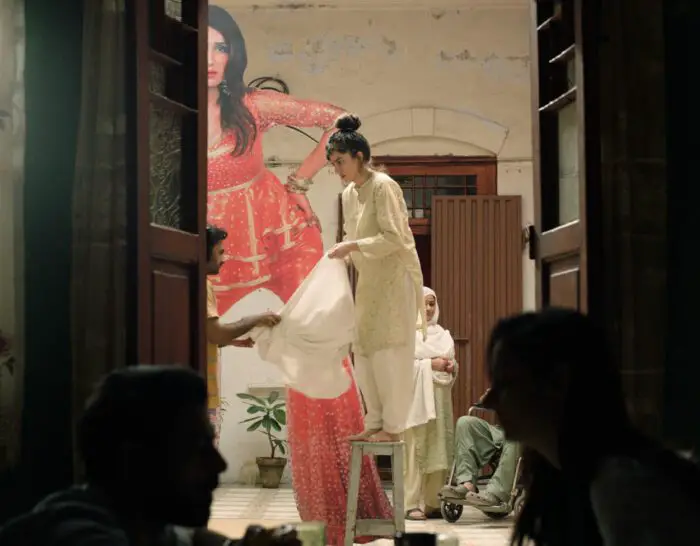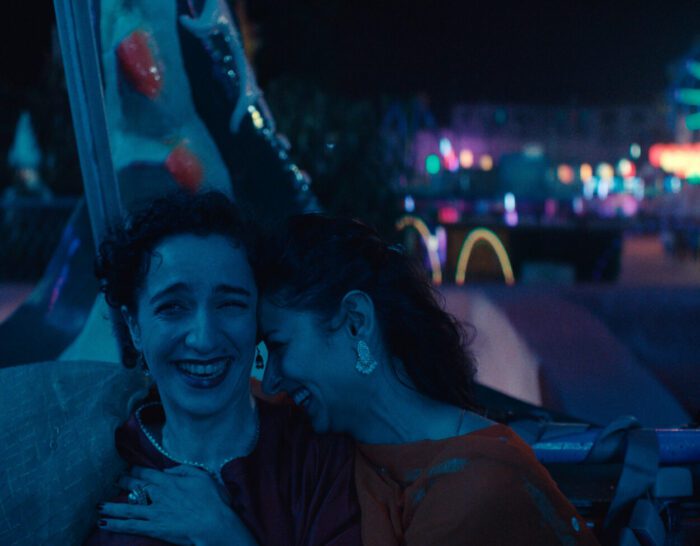A radical, poignant and often exceptionally beautiful film, Joyland is a stunningly subversive attack on traditional gender roles not just as they exist in the most puritanical, patriarchal corners of inner-city Lahore, but across the globe. Together with his co-writer Maggie Briggs, director Saim Sadiq (whose work here is so staggeringly confident and articulate that I’m shocked it’s his first feature) manages to navigate the nuances of his drama with such precision that its scope explodes, tackling such a breadth of specificities that by the time his film winds down to its conclusion, it feels as if the entire concept of gender itself is on trial. Scene by scene we see how gender cages each of its characters and how ideals of propriety poison the spirit by degrees. It’s one of the most fascinating, surprising, and pointed tragedies in recent years.
The film follows a family, principally a husband and wife, Haider (Ali Junejo) and Mumtaz (Rasti Farooq). Haider is quiet, gentle, and reserved: he shrinks from conflict, especially from his father Rama (Salmaan Peerzada) who spends his days dictating to his family from his wheelchair, chastising Haider’s femininity and harassing him to produce a son to continue the family line, while comparing him unfavorably to his gruff, chauvinistic brother-in-law (Sohail Sameer) whose children Haider is only too happy to help raise. Not so Mumtaz, though. She wants a career and although she knows what’s expected of her, she has no interest in raising her in-laws’ children, let alone having any of her own.
Bowing to pressure to become the breadwinner, Haider has his buddy pull some strings and find him work, and soon discovers himself auditioning as a backing dancer at a burlesque show. Equally horrified of either remaining unemployed or having his father discover his new occupation, Haider takes the job and finds himself working under Biba (Alina Khan) the show’s support act hoping to claw her way to becoming headliner.

As a trans woman, Biba has had no choice but to fight her way out of the cage her assumed gender was for her. She’s had to sacrifice so much to be herself, and now she’s making a living in her chosen profession, through her beauty, charisma, sensuality and pure drive to succeed in a world that would cast her aside if she took her foot off the gas for a second. Of course Haider, who has lived his whole life under the burden of expectation his maleness is to him, would become entranced by someone who defied every one of those expectations. But like all Joyland’s characters, there’s more to Biba, and as she reciprocates Haider’s affections, she leaves herself open to being hurt by someone who’s more in love with the idea of her than by her herself; while Mumtaz, feeling Haider’s dissatisfaction, becomes increasingly restless and fearful in her own fate.
The tragedy of Joyland lies in that it doesn’t have to be like this. The cages confining our characters are all figments of a social imagination. There’s no reason for any of them, just petty prejudicial judgement and internalized guilt and shame wrestling with the hearts of its characters yearning to be free from the expectations of others that are entirely based in gender. If Haider were a woman, he could have everything he wants, if Mumtaz were a man, she could have everything she wants, and through Biba, we see what a daily battle it is to break out of those roles and follow your heart’s desires. Biba is fighting the battles both Mumtaz and Haider shrink from. She has defied the gender role society projected onto her since birth, as Haider yearns to, and has fought to become a successful, independent career woman as Mumtaz so desperately needs to be. It may sound crass in these terms, but she really does have the best of both worlds, and all it took was risking her life as the subject of the derision, suspicion, and fetishization of a society too small-minded to understand her easily and too fearful to make the effort.
Each of these characters is interpreted perfectly by the cast. Junejo beautifully expresses the tragic pathos of being a person for whom society has no place, a deer in the headlights, first of the expectations of the men around him and then of Biba’s beauty. His awkward, sunken self shrinks from any consequences of his actions, allowing the world to carry him through life as it will, too scared to publicly defy his role as a ‘man’ and wrestling with his indoctrinated homophobia even as he tentatively attempts to explore his individuality and sexuality. He’s gentle and scared, but also naïve and selfish and his hesitancy comes more from fear for his own pride than for those who his actions might hurt.

But although he is the main character, it’s the women who are the stars of Joyland. Khan, the first trans woman to ever have a leading role in a Pakistani production, has rightly been regarded as a revelation, embodying Biba’s determination, humor and vulnerability effortlessly. As Mumtaz, Farooq is quietly devastating, wrestling with the disappointment her life is becoming and feeling powerless to alter her course. The stories of these characters are tragic because they’re intertwined and create a mosaic portrait of yearning and hope for a time and place where people are free to be themselves without fear or judgement, a sentiment that the film’s final shot conveys with sublime poignancy in one of the best film endings of the last twelve months. Whatever the dramatic peaks the film hits beforehand, it’s here that the tears flow.
The cinematography throughout is excellent with Joe Saade’s narrow aspect ratio a perfect match for the secretive domestic spaces and the confinement of the characters, and consistently frames these people with large amounts of neutral space above and behind them, a constant reminder of the world watching over their shoulders or the empty space they might ascend into. The editing too, by Jasmine Tenucci and Sadiq himself, constructs a sense of pace that’s patient and meditative, but never dull or wasteful. The film uses just one flashback, near the end and it’s devastating in it’s naive optimism, a distant echo of the ‘happy ending’ of Irreversible, converting the film’s tragedy into an unbearably earnest glimmer of hope.
Joyland is astoundingly mature for a first film, but then some of my favorite films of recent years have come from debutante filmmakers bringing personal passion projects to the screen after what must have been years of hard graft and revision, and I might well say that Joyland has earned its place among them. By concentrating on a family, and expanding its gaze through each extended member, Joyland manages to construct and empathetic portrait of a society whose every member is constrained by its shared values, and bring to vivid life the specter of one where that need not be so.



